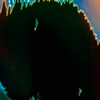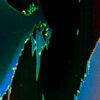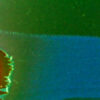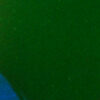These are the rules. I make a list of accidents – sentences I’ve misread with my misreading left in them; speech I’ve overheard or heard wrong; lines from my email outbox. Emailing can occasionally bring out an approachable, thoughtless or direct tone in me. I don’t think you can artificially replicate the energy of that kind of phrase.
I add lines from my diary that had something unconscious happening in them, a revelation I didn’t plan. In my diary I try to write straightforward descriptions of, for example, a plant or a rivulet on a beach or a cliff, hoping my emotions will show through in surprising ways. Even if not, I like the idea of using natural shapes to illustrate human dynamics that seem less concrete.
My list sits on my computer until, one day, I find a first line. A first line is meant to be a first line, but sometimes it’s too obvious and you avoid it because it’s intimidating. A number of my notes will go along with it. I move these notes to a different document, and, in a third document, assemble them according to how they feel. It’s an instinctive, emotional process, to do with remembering the sentences’ origin and sensing new relations they could have. It happens in a rush. Along the way I will add transitions, semantic, sonic or syntactic. The piece has to travel, it can’t have too many characters, and if I am dishonest or overly sure in the way I pick and assemble, it won’t succeed.
Shame is a large part of my writing, almost to the point that if I’m not taken aback (even mortified) by something when I send it off to an editor, I believe it’s probably no good. I don’t feel in control. I don’t feel intentional. Having an editor is very important to me.
With my book, The Weak Spot, the work was similar to when I’ve written short stories, except that at some point, near the end of road, I was able to write in a more linear way, and the story had taken over. That was the closest I’ve come to feeling that, dangerously, the rules had changed, that I was abandoning some of the tricks that worked for me, and couldn’t explain why.
My characters’ traits came to me at random: at a dance performance with aggressive audience participation; at a job interview to become a psychoanalyst; when I visited the castle of an unpopular king.
The Weak Spot is set in a pharmacy in a landscape that felt and looked similar to a region of France my family is from, the Auvergne. My grandparents found me some folktales from the area during the edit. I wanted to use them, and not just use them but transform them. One, the story of a mythical beast who ate women starting with their throats, I’d been told as a child. I experimented with translating the tales, drawing from French’s more normal use of figurative language: bluebells embalm woods, the month of May greens nature, fear capsizes people. Something about the slightly foreign-sounding turns of phrase matched the state of disorientation my narrator felt.
I tried to respect images that came to me. I had a dream about skipping rope with someone’s braid in a church and it seemed so symbolic that I included it. So much ‘invention’ seems to be unconscious gap-filling; often I realised I had an assumption about what a place looked like and all that was left for me to do was to put it down. It seemed like I was constantly trying to balance out the tone of the book by adding more of myself, more of what was personal or evident or close to me.
I used the first person, which allowed me to convey how the narrator is buffeted around as she listens to others talk. One day, for some reason, I switched to the third person. This is apparently a trick Jane Austen employed, and I can see why: it leaves traces of interiority.
In the end, the third person was wrong for the book, but reading the story at arm’s length from outside of the narrator’s head made its lack of physicality more apparent. I watched actors on talk shows and mined them for mannerisms that were as meaty as those in the bodily folk stories. After doing this, which added texture, I switched back to first person. My book partly deals with the mundane dynamics that surround an abuse of power – an abuse during which no one realises what’s going on – so it was important for the reader to feel in the know, but actually be roped into a state of denial, like the narrator.
Image © Rookuzz








